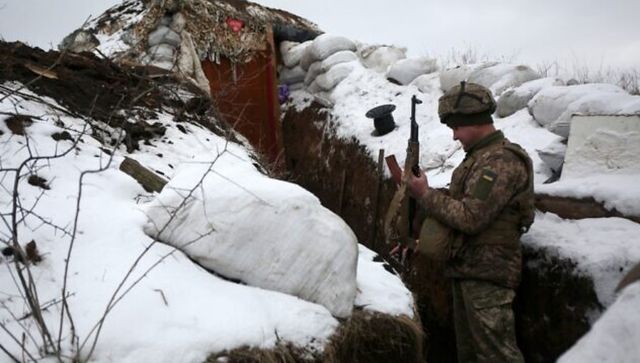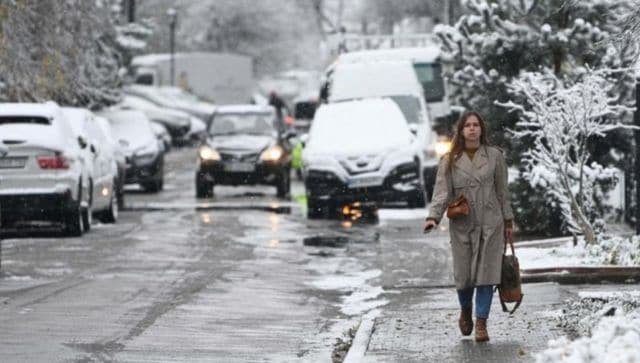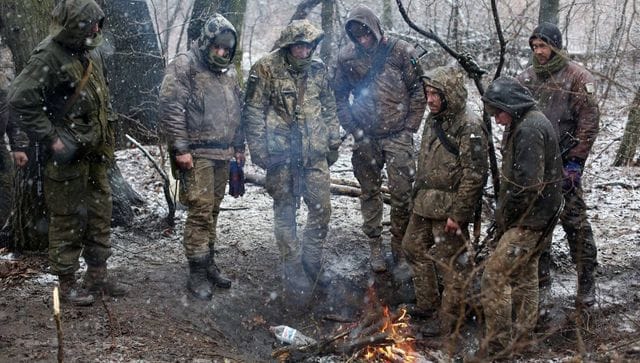How ‘General Winter’ can affect the Russia-Ukraine war
[ad_1]
Ukraine’s president Volodymyr Zelenskyy had warned in October, “This will be the most difficult winter in the whole world”.
“These will be 90 days that will be a test for our faith in victory. A test for our endurance and unity, for our ability to protect ourselves, the whole world”, he had added.
With the winter setting in, more “challenges and opportunities” are expected depending on its severity for both Ukraine and Russian troops, Jeffrey Levine, a former US ambassador to Estonia, said, as per USA Today.
US intelligence agencies are of the view that fighting in Ukraine which has been slackening will further slow down in the coming freezing winter months.
“We’re seeing a kind of a reduced tempo already of the conflict… and we expect that’s likely to be what we see in the coming months,” US director of intelligence Avril Haines told NBC News.
She said both sides will try to “refit, resupply and reconstitute” for any counter-offensive in the spring, as per BBC.
What challenges and opportunities does winter bring in Russia’s war with Ukraine? How winter has benefited Russia in the past? We explain.
Winter challenges and opportunities
November to March are the coldest months in Ukraine which bring below zero temperatures, high precipitation – snow and rain, and reduced daylight hours.
The foremost challenge faced by both the armed forces is surviving the biting cold. Warm clothing, hot food and protection from the chilly weather are essential for “preserving a military force in the coldest months”, says Sydney Morning Herald.
Sam Cranny-Evans of the RUSI think tank told The National in November, “The temperature is dropping rapidly so it’s a big question over whether both sides are actually ready for winter coming as it will be cold, wet and freezing which can certainly exacerbate the fighting spirit.”
The West has promised Ukraine warmer clothing for the winter.
Canada sent 5,00,000 sets of cold weather gear, including parkas, trousers, boots and gloves.
The British Defense Ministry said it dispatched 1,95,000 winter clothing materials to Ukraine. The UK has also committed 12,000 sleeping kits and 150 heated tents.
The US has provided 50,000 parkas, 23,000 pairs of boots, 4,700 trousers, 39,000 fleece hats, 18,000 pairs of gloves and 6,000 tents, as per USA Today.

Many Western countries pledged warm clothing for Ukraine troops. AFP (Representational Image)
“When a soldier is in warm clothes, he will fight in the cold; when the ground is dry and hard, he will feel comfortable and then there will be a tendency to intensify hostilities,” Ukrainian reservist Col Oleh Zhdanov was quoted as saying by The National.
On the other hand, Russians, who are also used to harsh colder temperatures, did not seem as prepared for the winter.
The National report in November said that Russian soldiers were coming to Ukraine without sleeping bags and with poor-quality equipment.
ALSO READ: Why Ukraine war and sanctions threaten to thrust Russia’s economy to a bygone era
The war which has entered its tenth month has witnessed Ukraine winning back Kherson and Kharkiv, forging a significant victory for the war-torn nation over its opponent Russia.
Many experts believe that the winter can pose a challenge for Ukraine to carry out more counter-offensives and furnish an opportunity for Russia to rebound.
Michael Kofman, an expert on the Russian military with think tank CNA, told Foreign Policy that Ukraine is “likely to have the more difficult task of pursuing offensive operations, whereas the Russian military seems largely set to defend”.
A blanket of snow on the roads and streets of Ukraine, and bare trees with no green cover for tanks and troops, are also some hardships for the soldiers on both sides.
As per Radio Free Europe/Radio Liberty, the loss of foliage can make it easier to use drones for discovering units and equipment hiding among the trees.
Flying in winter months could also be a tough task for crewed and autonomous aerial vehicles, says Sydney Morning Herald.
The wet, damp conditions have also led to a surge in flu and tetanus cases in Ukraine, reported The National.
It is in February when the deep freeze would settle and the ground becomes rock solid. “The advantage, then, is to the force that is able to take advantage of that, and Ukrainians are, in general terms, in a much better position to take advantage of that than the Russians,” Fred Kagan, a senior fellow with the American Enterprise Institute, told Foreign Policy.
ALSO READ: TIME magazine names Ukraine’s Zelenskyy ‘Person of the Year’
‘Weapon of war’
Russia has made bids to take advantage of the biting cold by attacking energy and heating systems with missile strikes, triggering power cuts across Ukraine as it “seeks to undermine public morale and pile pressure on the Zelenskyy government”, says Foreign Policy.
NATO Secretary-General Jens Stoltenberg had earlier accused Russia of trying to use winter as a “weapon of war”.
In the winter months, the ‘obvious choice’ for Russia would be to buy more time to rebuild its forces, a Foreign Policy report said.
Russian troops are building trenches and anti-tank fortifications, the report added citing commercial satellite imagery.

Russia attacked energy systems in Ukraine in the past weeks. AFP
Meanwhile, Russian president Vladimir Putin’s forces are making attempts to gain territory in the Donbas, as fighting continues in Bakhmut, a small city in the Donetsk region.
On Wednesday, Putin admitted that the conflict with Ukraine is “going to take a while,” adding that Moscow will fight by “all available means at our disposal”.
‘General Winter’
The winter has favoured Russia in its many wars in the past.
The cold weather helped the nation to halt advances made by Napoleon Bonaparte and Adolf Hitler, thus being known as “General Frost” or “General Winter.”
In June 1812, when French emperor Napoleon invaded Russia during the ‘General Winter’, the result was a disaster for his 4,50,000-strong army.
The defeated French Army had to return from Moscow, with only 40,000 “limping into Paris by December” notes The National.
German dictator Hitler’s forces suffered a similar fate in World War Two. The Soviets had launched many offensives in the winter, including when they had surrounded German forces in Stalingrad, The National said.
With inputs from agencies
Read all the Latest News, Trending News, Cricket News, Bollywood News,
India News and Entertainment News here. Follow us on Facebook, Twitter and Instagram.
[ad_2]
Source link


Comments are closed.